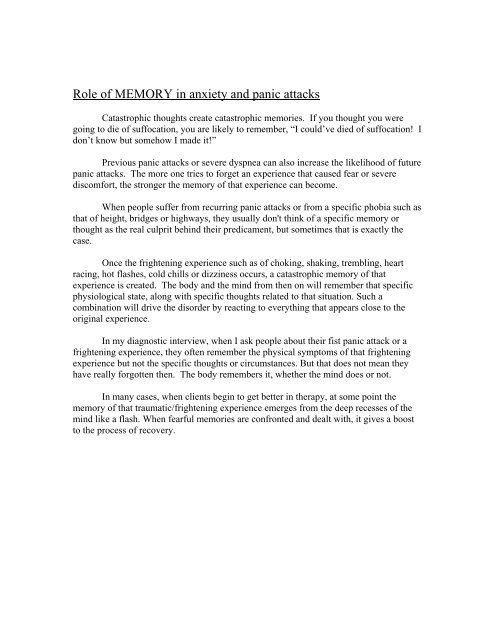Anxiety and Panic Attacks In Emphysema ... - Mind Publications
Anxiety and Panic Attacks In Emphysema ... - Mind Publications
Anxiety and Panic Attacks In Emphysema ... - Mind Publications
Create successful ePaper yourself
Turn your PDF publications into a flip-book with our unique Google optimized e-Paper software.
Role of MEMORY in anxiety <strong>and</strong> panic attacks<br />
Catastrophic thoughts create catastrophic memories. If you thought you were<br />
going to die of suffocation, you are likely to remember, “I could’ve died of suffocation! I<br />
don’t know but somehow I made it!”<br />
Previous panic attacks or severe dyspnea can also increase the likelihood of future<br />
panic attacks. The more one tries to forget an experience that caused fear or severe<br />
discomfort, the stronger the memory of that experience can become.<br />
When people suffer from recurring panic attacks or from a specific phobia such as<br />
that of height, bridges or highways, they usually don't think of a specific memory or<br />
thought as the real culprit behind their predicament, but sometimes that is exactly the<br />
case.<br />
Once the frightening experience such as of choking, shaking, trembling, heart<br />
racing, hot flashes, cold chills or dizziness occurs, a catastrophic memory of that<br />
experience is created. The body <strong>and</strong> the mind from then on will remember that specific<br />
physiological state, along with specific thoughts related to that situation. Such a<br />
combination will drive the disorder by reacting to everything that appears close to the<br />
original experience.<br />
<strong>In</strong> my diagnostic interview, when I ask people about their fist panic attack or a<br />
frightening experience, they often remember the physical symptoms of that frightening<br />
experience but not the specific thoughts or circumstances. But that does not mean they<br />
have really forgotten then. The body remembers it, whether the mind does or not.<br />
<strong>In</strong> many cases, when clients begin to get better in therapy, at some point the<br />
memory of that traumatic/frightening experience emerges from the deep recesses of the<br />
mind like a flash. When fearful memories are confronted <strong>and</strong> dealt with, it gives a boost<br />
to the process of recovery.


